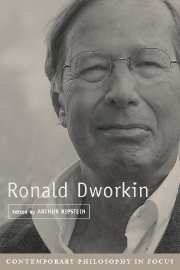Book contents
- Frontmatter
- Contents
- Contributors
- Introduction: Anti-Archimedeanism
- 1 The “Hart–Dworkin” Debate: A Short Guide for the Perplexed
- 2 The Rule of Law as the Rule of Liberal Principle
- 3 Liberty and Equality
- 4 Rights, Responsibilities, and Reflections on the Sanctity of Life
- 5 Hercules, Abraham Lincoln, the United States Constitution, and the Problem of Slavery
- Bibliography
- Index
4 - Rights, Responsibilities, and Reflections on the Sanctity of Life
Published online by Cambridge University Press: 05 June 2012
- Frontmatter
- Contents
- Contributors
- Introduction: Anti-Archimedeanism
- 1 The “Hart–Dworkin” Debate: A Short Guide for the Perplexed
- 2 The Rule of Law as the Rule of Liberal Principle
- 3 Liberty and Equality
- 4 Rights, Responsibilities, and Reflections on the Sanctity of Life
- 5 Hercules, Abraham Lincoln, the United States Constitution, and the Problem of Slavery
- Bibliography
- Index
Summary
An intrinsic feature of Ronald Dworkin's jurisprudence is his insistence that there are no bright lines between legal and nonlegal discourse, between problems in political philosophy and those in constitutional theory, between political morality and law. For Dworkin, the need to articulate philosophical questions and to answer them grows out of practical issues that demand action of judges, legislators, lawyers, and citizens. He thus calls for doing “philosophy from the inside out.” Nowhere is this clearer than on the issues of abortion and the right to die, to which Dworkin has devoted an entire elegantly written and brilliantly argued book, Life's Dominion.
The practical decisions for which Dworkin seeks answers exist at all of these levels in both the abortion and the right-to-die arenas. For judges, there is the question of what constitutional boundaries should be articulated and enforced with regard to state and federal attempts to regulate abortion and physician-assisted suicide. For legislators, not only the constitutionality but also the wisdom, fairness, and advisability of restrictions, and the particular nature of these restrictions, need to be considered. Lawyers must think through these issues, of course, as well as the broader issues of what sort of counsel is appropriate to citizens and legislators and what sort of law ought and ought not to exist in these areas. And finally, for citizens, there are not only the gripping dilemmas of whether to have an abortion and whether to assist suicide, seek assisted suicide, or create a living will; there are also questions about how to talk about and resolve these issues in a mutually respectful way in a constitutional democracy that evidently views them as all-or-nothing matters.
- Type
- Chapter
- Information
- Ronald Dworkin , pp. 109 - 135Publisher: Cambridge University PressPrint publication year: 2007

